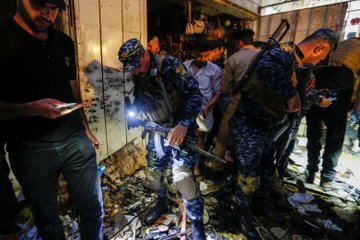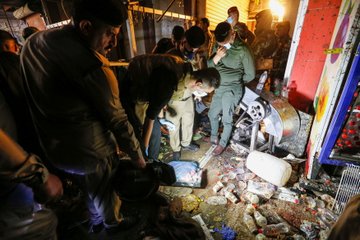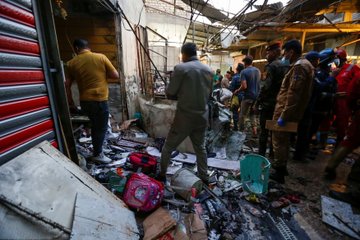Reporters are now claiming greater and greater license to frame news to illustrate the truth as they see it. They nod to the need for fairness but then note that they have to tell the truth about society and politics as they see it. They then seek to frame rather than report the news. Hannah-Jones is a great example of how this new journalism quickly becomes raw advocacy.
We have have been discussing how writers, editors, commentators, and academics have embraced rising calls for censorship and speech controls, including President-elect Joe Biden and his key advisers. Even journalists are leading attacks on free speech and the free press. Bias is now treated as something that is natural and motivating. Recently, Lauren Wolfe, the recently fired freelance editor for the New York Times, has not only gone public to defend her pro-Biden tweet but published a piece titled “I’m a Biased Journalist and I’m Okay With That.”
This movement includes academics rejecting the very concept of objectivity in journalism in favor of open advocacy. Columbia Journalism Dean and New Yorker writer Steve Coll has denounced how the First Amendment right to freedom of speech was being “weaponized” to protect disinformation. In an interview with The Stanford Daily, Stanford journalism professor, Ted Glasser, insisted that journalism needed to “free itself from this notion of objectivity to develop a sense of social justice.” He rejected the notion that the journalism is based on objectivity and said that he views “journalists as activists because journalism at its best — and indeed history at its best — is all about morality.” Thus, “Journalists need to be overt and candid advocates for social justice, and it’s hard to do that under the constraints of objectivity.”
For those of us who have worked for decades as columnists and in the media, the growing intolerance for dissenting views is stifling and alarming. Hannah-Jones has been a leading voice in attacking those with opposing views. A year ago, the New York Times denounced its own publishing of an editorial of Sen. Tom Cotton (R., Ark.) calling for the use of the troops to restore order in Washington after days of rioting around the White House. It was one of the one of the lowest points in the history of modern American journalism. While Congress would “call in the troops” six months later to quell the rioting at the Capitol on January 6th, New York Times reporters and columnists called the column historically inaccurate and politically inciteful. Reporters insisted that Cotton was even endangering them by suggesting the use of troops and insisted that the newspaper cannot feature people who advocate political violence. (One year later, the New York Times published a column by an academic who has previously declared that there is nothing wrong with murdering conservatives and Republicans).
Patti Labelle's music video for "Yo Mister."
That's a song Prince wrote for her. I bring that up in relation to my "Jonathan Turley -- plus I'm not a fan of Maroon 5" post. I like Prince. His songs still have life and bite. He was a songwriter who had a voice. That's the sort of songwriting I enjoy and that speaks to me. Jack Johnson has his own unique voice when he writes a song, Joni Mitchell surely does, a lot of people can write a good song. But they don't have a voice.
Carole King wrote hundreds of hit songs (more often the melody than the words) but she has no voice. That's really why her solo career cratered. For TAPESTRY, Lou Adler encouraged her to listen to Laura Nyro knowing it would be like telling her that they had to get the next Drifters single, she'd focus and zero in on how to best copy. She did that on Tapestry -- by listening non-stop to Laura as Carole's then husband revealed. The success of TAPESTRY confused Carole into thinking she had a voice (in songwriting). She didn't and still doesn't. She's all over the map because she has no voice.
It's why Chase Rice's THE ALBUM registers so strongly with so many of us, he's found his voice and he's writing what appears to moments ripped from his life.
Did The Eagles have a voice?
I don't think so. I think Don Henley had and has a voice. I think the rest were just trying to write hit songs and would go for anything. You could make that argument about Fleetwood Mac as well -- that Stevie Nicks has a unique voice but others in the band are just trying to write hits.
Ann and Nancy Wilson, of Heart, are talented songwriters, but at their very worst, their song would still be worth listening to because they write from their own voice. They're not generic. Sade's also someone expressing a point of view in her songs.
"Iraq snapshot" (THE COMMON ILLS):
Tuesday, July 20, 2021. A Baghdad suicide bombing leaves many dead and injured.
A bombing in Iraq has left mass fatalities. The target? Moqtada al-Sadr's home base in Baghdad, Sadr City. The slum that remains a slum because Moqtada grand stands a great deal but has done nothing to improve the quality of life of his followers.
Sebastian Usher Tweets:
BASNEWS ENGLISH Tweets:
Mohammed Tawfeeq (CNN) explains, "Children and women were among the dead and wounded, according to health and security officials. The blast took place in the Wahailat outdoor market in Sadr City, a predominantly Muslim Shia neighborhood in the east of Baghdad." BBC NEWS observes, "It was the deadliest bombing in Baghdad in six months" while REUTERS notes, "In April, the Sunni Muslim militant group Islamic State claimed responsibility for a car bomb attack on a market in Sadr City, Baghdad's main Shi'ite Muslim neighbourhood, that killed four people and wounded 20." GULF TODAY notes a more recent bombing, "In June, 15 people were wounded when a bomb placed under a kiosk in another Sadr City market detonated. In April, at least four people were killed in a car bomb attack in Sadr City. That blast was caused by an explosive device attached to a parked car at the market." Three major attacks in four months? In Sadr City alone? No, ISIS was never vanquished. The lost territory they held but terrorists groups don't usually take over cities. They generally hide in the shadows and wait. Which is what ISIS is back to doing and has been for some time now. Meanwhile, how does Moqtada go out in public right now having yet again failed to protect his followers in the section of Baghdad named after his family?
NDTV reports, "In the panic and chaos of the attack, screams of terror and anguish filled the air. When the smoke cleared, human remains lay strewn amid scattered sandals, market produce and the charred debris of stalls."
REUTERS Tweets:
At least 35 are dead with at least sixty more left injured and the tolls on both could continue to rise. AFP notes, "In a message posted to its Telegram channel, the militant group said a suicide bomber named Abu Hamza al-Iraqi detonated his explosive belt in the middle of a crowd in Sadr City, an eastern Baghdad suburb on Monday night, killing more than 30 and wounding 35 others." BBC NEWS' Nafiseh Kohnavard Tweets:
The head of the United Nations on Monday condemned a bombing in a
crowded Baghdad market that killed at least 35 people and injured more
than 60.
“The Secretary-General strongly condemns the horrific bomb attack
targeting civilians at a market in Al-Sadr City today,” read a statement from Farhan Haq, deputy spokesperson for Secretary-General Antonio Guterres.
“This deadly attack ahead of the Eid al-Adha holiday is a reminder to us
all that the scourge of terrorism knows no bounds,” he added.
ZHYAN ENGLISH notes others condemning the bombings:
On the topic of Moqtada al-Sadr, Mina Aldroubi (THE NATIONAL) reported two days ago:
The withdrawal of populist Iraqi cleric Moqtada Al Sadr from the country’s political process is no “surprise”, experts told The National.
Iraq has been beset by a wave of public-service disasters, the most recent of which include a hospital fire that killed 92 people and a national power cut in the blazing summer heat.
“This is not the first time and, to many, not a surprise that Moqtada Al Sadr is coming out and claiming to leave the political process,” said Renad Mansour, a senior research fellow at the Chatham House think tank in London.
“He’s done this in the past and even before elections, and it’s part of his vision of being above politics, to some extent.”
Mr Al Sadr said last week that he would boycott Iraq’s upcoming elections to distance himself from the government.
The cleric is known to be one of Iraq’s most influential religious figures, heading a political bloc in Parliament that was the biggest winner of the 2018 elections.
Sairoon has significant influence and gained 54 seats in Parliament, the most won by any party or bloc in the 329-member legislature.
In the past, Mr Sadr has withdrawn from frontline politics without dismantling his powerful movement.
He now appears to want to distance himself from publicly recognised political appointments among his Sadrist followers and remould himself as someone above the fray of day-to-day political turmoil.
Iraq’s ongoing, multi-sector collapse of public services came to a head earlier this month when the national grid suffered a catastrophic failure. Electricity production plunged from 20 gigawatts – already 10 gigawatts below peak demand – to eight gigawatts.
But since 2019, armed groups linked to political parties backed by Iran have resisted a national protest movement, killing at least 500 people.
“This is a time where people are angry at the government, and so this is what he does,” Mr Mansour told The National.
Turning to the US, Patrick Martin (WSWS) weighs in on US President Joe Biden's leadership or 'leadership' thus far:
When Biden took office, 400,000 people were dead from the COVID-19 pandemic, while millions were unemployed. Just months earlier, every city, town, and village in America had seen protests in opposition to police violence.
Biden marked the six-month anniversary with brief remarks presenting American society in glowing terms. “For all those predictions of doom and gloom six months in, here’s where things stand,” he said. “Record growth, record job creation, workers getting hard-earned breaks.” He added, “Put simply: Our economy is on the move, and we have COVID-19 on the run.”
Summing up his prognosis, the US president proclaimed: “It turns out capitalism is alive and very well.” The truth is that the policies of the Biden administration have entirely failed to resolve the social crisis in America and they cannot, because they are based on the framework of American capitalism.
The pandemic, far from being “on the run,” is undergoing a new resurgence. Since Biden took office, an additional 225,000 people have died from the pandemic. All indications are that by the winter, with the new surge accompanying the spread of the Delta variant, the death toll under Biden will have exceeded that under Trump.
The policies of the Biden administration have been driven by the interests of Wall Street and the super-rich. This is why, despite occasional criticisms of Trump’s callous and anti-scientific response to the coronavirus pandemic, Biden has pursued the same policy of restoring corporate profit-making by forcing workers back to work and children back to school as quickly as possible, regardless of the dangers to their lives and health.
The following sites updated:






